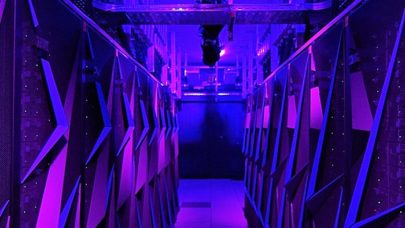
ISC19 Cluster Competition: HPCC Deep Dive
July 7, 2019
The biggest benchmark the student warriors tackled during the ISC19 Student Cluster Competition was the colossal HPC Challenge. This is a collection of benchmar Read more…

Berkeley Lab’s John Shalf Ponders the Future of HPC Architectures
June 27, 2019
What will scientific computing at scale look like in 2030? With the impending demise of Moore’s Law, there are still more questions than answers for users and Read more…

Is Weather and Climate Prediction the Perfect ‘Pilot’ for Exascale?
June 21, 2019
At ISC 2019 this week, Peter Bauer – deputy director of research for the European Centre for Medium-Range Weather Forecasts (ECMWF) – outlined an ambitious Read more…

ISC Keynote: Thomas Sterling’s Take on Whither HPC
June 20, 2019
Entertaining, insightful, and unafraid to launch the occasional verbal ICBM, HPC pioneer Thomas Sterling delivered his 16th annual closing keynote at ISC yesterday. He explored, among other things: exascale machinations; quantum’s bubbling money pot; Arm’s new HPC viability; Europe’s... Read more…

IBM Claims No. 1 Commercial Supercomputer with Total Oil & Gas System
June 20, 2019
IBM can now boast not only the two most powerful supercomputers in the world, it also has claimed the top spot for a supercomputer used in a commercial setting. Read more…

HPC on Pace for 5-Year 6.8% CAGR; Guess Which Hyperscaler Spent $10B on IT Last Year?
June 20, 2019
In the neck-and-neck horse race for HPC server market share, HPE has hung on to a slim, shrinking lead over Dell EMC – but if server and storage market shares Read more…

ISC 2019 Research Paper Award Winners Announced
June 19, 2019
At the 2019 International Supercomputing Conference (ISC) in Frankfurt this week, the ISC committee awarded the event's top prizes for outstanding research pape Read more…

ISC Keynote: The Algorithms of Life – Scientific Computing for Systems Biology
June 19, 2019
Systems biology has existed loosely under many definitions for a couple of decades. It’s the notion of describing living systems using first-principle physics Read more…

- Click Here for More Headlines

Whitepaper
Transforming Industrial and Automotive Manufacturing
In this era, expansion in digital infrastructure capacity is inevitable. Parallel to this, climate change consciousness is also rising, making sustainability a mandatory part of the organization’s functioning. As computing workloads such as AI and HPC continue to surge, so does the energy consumption, posing environmental woes. IT departments within organizations have a crucial role in combating this challenge. They can significantly drive sustainable practices by influencing newer technologies and process adoption that aid in mitigating the effects of climate change.
While buying more sustainable IT solutions is an option, partnering with IT solutions providers, such and Lenovo and Intel, who are committed to sustainability and aiding customers in executing sustainability strategies is likely to be more impactful.
Learn how Lenovo and Intel, through their partnership, are strongly positioned to address this need with their innovations driving energy efficiency and environmental stewardship.
Download Now
Sponsored by Lenovo
Whitepaper
How Direct Liquid Cooling Improves Data Center Energy Efficiency
Data centers are experiencing increasing power consumption, space constraints and cooling demands due to the unprecedented computing power required by today’s chips and servers. HVAC cooling systems consume approximately 40% of a data center’s electricity. These systems traditionally use air conditioning, air handling and fans to cool the data center facility and IT equipment, ultimately resulting in high energy consumption and high carbon emissions. Data centers are moving to direct liquid cooled (DLC) systems to improve cooling efficiency thus lowering their PUE, operating expenses (OPEX) and carbon footprint.
This paper describes how CoolIT Systems (CoolIT) meets the need for improved energy efficiency in data centers and includes case studies that show how CoolIT’s DLC solutions improve energy efficiency, increase rack density, lower OPEX, and enable sustainability programs. CoolIT is the global market and innovation leader in scalable DLC solutions for the world’s most demanding computing environments. CoolIT’s end-to-end solutions meet the rising demand in cooling and the rising demand for energy efficiency.
Download Now
Sponsored by CoolIT
Advanced Scale Career Development & Workforce Enhancement Center
Featured Advanced Scale Jobs:
HPCwire Resource Library
HPCwire Product Showcase
© 2024 HPCwire. All Rights Reserved. A Tabor Communications Publication
HPCwire is a registered trademark of Tabor Communications, Inc. Use of this site is governed by our Terms of Use and Privacy Policy.
Reproduction in whole or in part in any form or medium without express written permission of Tabor Communications, Inc. is prohibited.
























